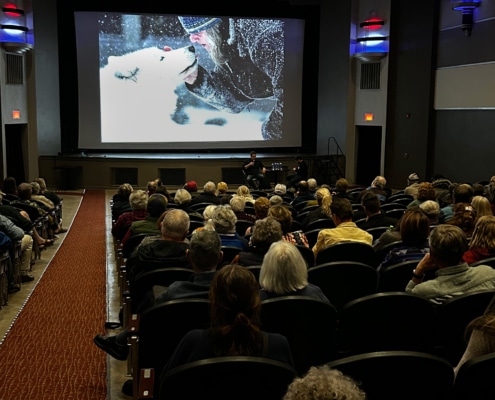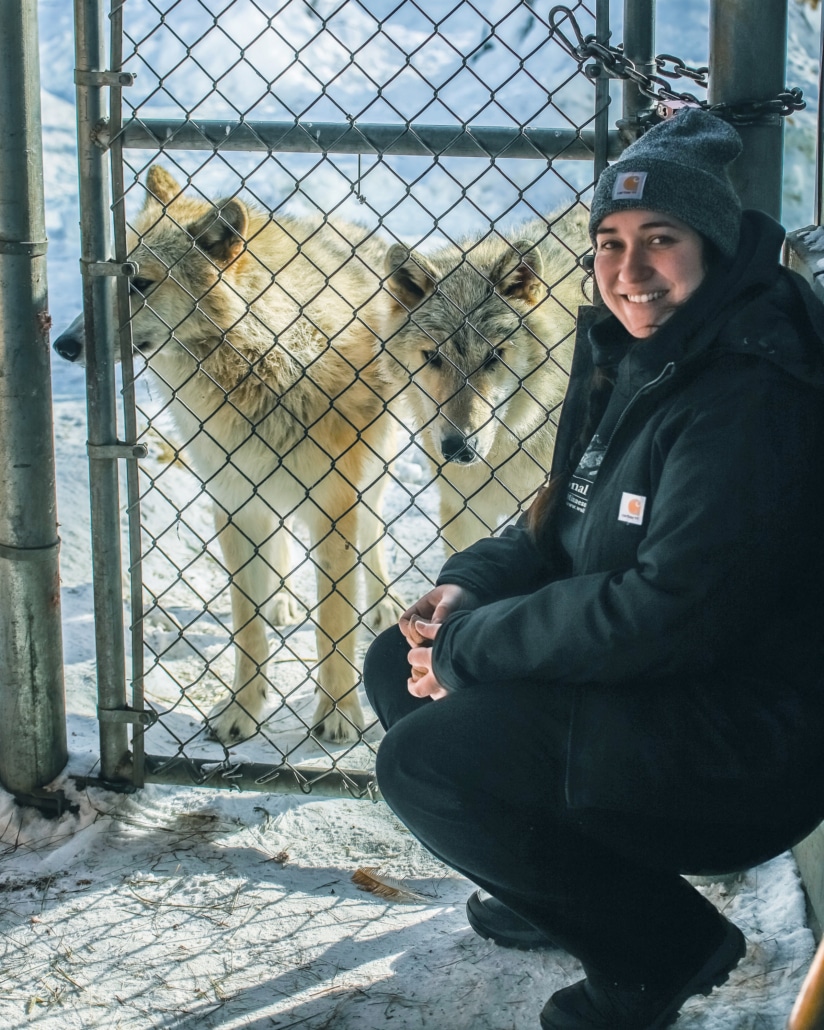From our leadership
Executive Director’s Letter
2023 was an interesting and busy year at the International Wolf Center. In many ways, it was a time of transition and change. We developed a new four-year strategic plan and underwent leadership transitions in Wolf Care, Communications and Development. We launched new initiatives in social media and wolf science and opened a new “Wolves and Musk Ox” exhibit. That’s a lot of change for just one year!
In other ways, however, 2023 was a demonstration of the stability of our organization. In May, we celebrated the 30th anniversary of the opening of our Visitor Center in Ely. We highlighted the occasion at a “State of Wolves” event that recognized the enduring legacy of the International Wolf Center and the work of our founder, Dr. L. David Mech. In October, we were able to hear from Dr. Mech again at our Howl at the Moon Pack Rally in St Paul, one of the fundraising highlights of a record-breaking year for community-driven financial support for our organization.
2023 also reminded us all of the importance of our work as the debate about wolf/human conflict became increasingly charged online and in communities around the globe, from Colorado to Europe to our own backyard in Northern Minnesota. The need for fact-based educational programming about wolves that cuts through the hype and emotions is as relevant and important now as ever. Thanks to everyone who has supported us over the last year, whether as a member, visitor, volunteer, or program participant – you are all important members of our pack!
Education
State of Wolves – May 24, 2023
A special event took place at Ely’s State Theatre to celebrate the 30th anniversary of the grand opening of the International Wolf Center. The evening started with a presentation by Star Tribune journalists Greg Stanley (reporter) and Anthony Souffle (photographer). They shared information about the natural and cultural history of wolves in Minnesota, focusing on the unique role that wolves play in Minnesota and Ely, and the dedicated individuals who work with and study them. Later they were joined by the Center’s founder, Dr. L. David Mech (on Zoom) who discussed his research in northern Minnesota and how that work led to the creation of the International Wolf Center.
Dr. L. David Mech Fellowships
The Dr. L. David Mech Fellowship annually awards up to two undergraduate students a $10,000 fellowship. The Fellowship aims to reduce barriers for students from diverse backgrounds by providing the bridge support necessary to explore careers in natural sciences or wildlife biology. Recipients receive a $6,000 stipend and are reimbursed up to $4,000 for research-related expenses such as gear and travel.
In 2023, Lucas Paschal, a recent graduate of Hamline University in St. Paul, MN, was awarded the Fellowship. Lucas participated in intense field work and data analysis with the Voyageurs Wolf Project in northern Minnesota. His work on the project included analyzing bone marrow samples to study the body condition of white-tailed deer preyed upon by gray wolves during the summer of 2023 in the Greater Voyageurs Ecosystem. Upon completion of this Fellowship project, Lucas planned to apply to graduate schools to continue his education and career path in biology and environmental studies.
Wolf Care
2023 Wolf Care Annual Summary
The year started with the arrival of our curator-in-training, Giselle Narváez Rivera. Under the valuable guidance of Lori Schmidt, Wolf Curator Emeritus, she was introduced to the wolf care team and the Exhibit Pack. This transition in leadership was designed to be smooth for both humans and our ambassadors.
Early in the year, the wolf care team diligently monitored Axel’s coat condition, noticing discoloration and dryness of his skin. Spring, the shedding season for wolves, revealed that Axel was not only shedding his undercoat but was also losing guard hairs. We conducted a medical exam on both him and his littermate, Grayson. He was diagnosed with sebaceous adenitis and his treatment plan was developed. We started to see tremendous improvement in Axel’s coat by October. His oral and topical treatments succeeded in growing back a thick coat and maintaining adequate moisture of his skin and hair. It was apparent that he would be well-equipped to handle the cold and snow of the winter season.
In the Fall, we began to see an increase in the displays of a maturing female from Rieka and the rise of a lower-ranking pack member in Blackstone. Rieka’s increased dominance over the yearling seemed to mostly fall on Blackstone, with Caz being on the receiving end of more socially motivated interactions. This set the tone for Blackstone’s place as the omega of the Exhibit Pack. By the end of the year, Grayson started displaying more confidence in his interactions with the rest of the pack. He was more assertive, held his tail higher, and sought out Rieka frequently to engage in social behaviors.
Thanks to generous donors, we reached important milestones in 2023:
- Hiring and training the new wolf curator
- Installation of two additional surveillance cameras that aided us in monitoring the dynamics and safety of our wolf ambassadors.
- Insulated our garage to maintain our equipment in good condition and installed a heater for thawing wolf food appropriately
- Made improvements to our retirement transition areas to provide wolves with additional cover during the more challenging weather conditions
Financial information
2023 was a strong year financially for the International Wolf Center, thanks to incredibly generous support from our members. With income of $2,942,944 and expenses of $2,343,655 we ended the year with net ordinary income of $599,289. The International Wolf Center was pleased to once again receive a four star rating from Charity Navigator in 2023—as an indicator of our organization’s effective use of donor resources to accomplish our wolf education mission.
Thank you!
Financial Statements
For older financial statements, please email info@wolf.org.
Annual Reports (pdf)
Financial Audits (pdf)
2023 Audited Financial Statement
2022 Audited Financial Statement
2021 Audited Financial Statement
Federal 990’s (pdf)

The International Wolf Center is a 501(c)(3) organization.






